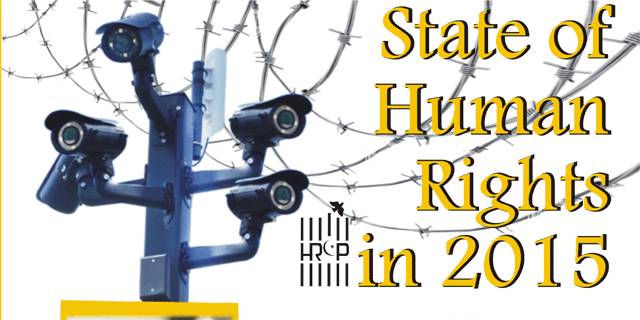Stocktaking and reporting to the people of the country about progressions or regressions in different sectors has not become a norm despite our tall claims about strengthening of democratic system in Pakistan. It is particularly so in the area of Human Rights where unfortunately the state itself remains the main violator of citizen’s rights. Luckily Human Rights Commission of Pakistan (HRCP) has been publishing an annual report on the state of human rights in Pakistan for the last so many years despite its limited resources and the difficult conditions under which the Commission is working. HRCP doesn’t claim to record or report every improvement or every violation in the country with a big population but the annual report of the Commission does provide a broad picture of the human rights situation.
The Commission’s report about 2015 that was released a few days ago in Islamabad is a useful and informative statement of the main trends of deteriorating situation of human rights as well as improvement in certain areas based on a quite comprehensive catalogue of the developments over the last one year. HRCP’s annual report covers vast area from rule of law, fundamental freedoms, democratic development to rights of disadvantaged and social and economic rights. It obviously opens with taking cognizance of the state’s efforts to restore its writ in areas where it was eroded by large scale activities of the well organised and well equipped terrorist networks. It particularly refers to the somewhat meaningful actions taken in the Federally Administered Tribal Area (FATA) and Karachi that has led to reduction in the overall number of incidents of terror in the country. But the report also notes the miseries of the about two millions Internally Displaced Persons from FATA and the serious violations at the hands of security forces during their operation in Karachi. Military courts that were brought as a quick fix solution in the face of an overburdened and over backlogged judicial system started working during 2015. Out of 131 cases of terrorism that were filed with the military courts the accused persons were found guilty in 40 cases. A total of 36 people were sentenced to death. The report opines, “But surely instant Justice was not enough to improve things. Frustration and concern welled up across the country each time the extremists attacked religious minorities, journalists and human rights defenders”. The report also notes the need for political solutions to problems faced by areas such as FATA and Balochistan, something that is talked about a lot but without meaningful practical steps. Enforced disappearances continue to take place but the perpetrators continued to enjoy impunity which according to the report, “emboldened others to indulge in such brutal acts”.
The situation remained dismal when it comes to achieving the goals of gender equality particularly in the area of economic development and access to justice. The report substantiates this assessment by quoting the annual report of the Geneva based World Economic Forum; “In the gender Gap Index 2015 ranked Pakistan second from the last among 145 countries in terms of the prevalence of gender based disparities.” Violence against women remained rampant including the so-called honor killing and acid attacks. From January to June 2015, 60 cases of acid violence were reported. But the HRCP report also flags positives where they are available. For example, taking note of positive things happening to Pakistani women it notes: “However, 2015 also turned out to be a year of many firsts for women in Pakistan: the first fire fighter; the first truck driver; the first female rickshaw driver; the first speakers of Balochistan and Khyber Pakhtunkhwa assemblies; and the first UN Goodwill ambassador from Pakistan, among many others.” Child protection system in the country remained in shambles during the last year. Pakistan did not succeed in implementing two out of the eight of the United Nations Millennium Development goals related to children. First of them is MDG 2, to achieve universal primary education and the second one is MDG 4, to reduce child mortality. The number of new polio cases has dropped but the menace of polio is far from over. Religious minorities continued to face exclusion, discrimination and violence due to widespread intolerance and lack of forums to address problems faced by them. The Council of Islamic Ideology (CII) continued to oppose legislation for empowering religious minorities and women. Discussing Blasphemy Law the report observes; “Accusations under Pakistan’s blasphemy law can prove life threatening for the accused even before they are arrested or tried in court, or even if the accusations against them are utterly unfounded”. According to the report number of sectarian attacks has dropped compared to previous year but the scourge of sectarian violence continued to wreak havoc. The 398 pages HRCP annual report presents a detailed overview of the situation and also comes out with recommendations for overcoming the challenges faced by the people in the area of human rights.
It is strange that generally the state system fails to take notice of such an important report, which can be of great help in taking steps for improvement of the situation. Unfortunately the institutional structures created within the state system for protecting human rights remain toothless and ineffective. The Division of Human Rights, that has been restored sometimes ago as a separate ministry after remaining part of the law ministry, remains a decoration piece rather than an effective instrument for implementing human rights. Same is the case with the National Commission on the Status of Women. The treatment meted out the recently formed National Commission on Human Rights in terms of total lack of intellectual and physical infrastructure speaks volumes about the state’s attitude towards human rights. Civil society in general and political parties in particular, along with international community will have to put in a lot of hard work for bringing human rights high on the agenda. The aforementioned level of priority will also define the quality of the democratic system in Pakistan.






